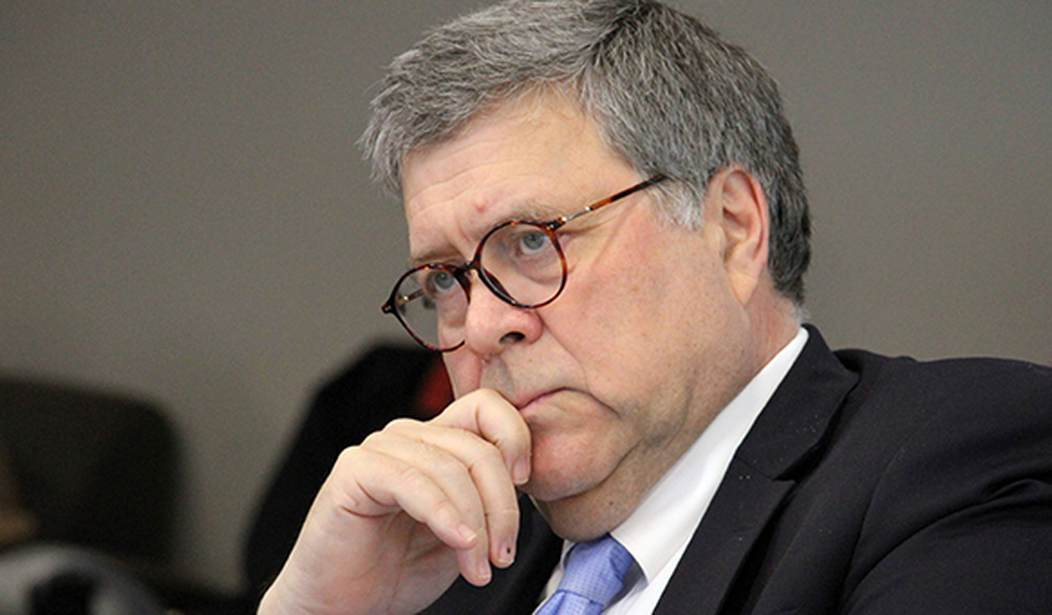The current hysteria surrounding Attorney General William Barr's decision to intervene in the Roger Stone case and override the Draconian and wholly unjustifiable sentencing recommendation made by prosecutors on the case is hypocritical and reflects a double-standard and a misunderstanding of the Attorney General's role and authority.
Based on reports from the DOJ, the prosecutors misled their superiors about the recommendation they would make. They were part of the Mueller Special Counsel team that had a partisan agenda from start to finish. They hoped to inflict the maximum punishment on Stone for his association with the president, after failing to prove their case against the president himself.
A lead prosecutor in the case, Jeannie Rhee, served as Hillary Clinton's personal lawyer in Ms. Clinton's email scandal. The information Roger Stone was accused of trying to obtain related not to Russia, but to Hillary Clinton's conduct.
Where is the outrage about this clear conflict of interest for the prosecution? Maybe it is missing because the federal judge in the Stone case imposed an unprecedented gag order on Stone, his family, friends, and his lawyers that prohibited any of them from publicly commenting on the case, criticizing the Mueller "investigation," and from posting anything on social media about the case or Mueller.
The Attorney General is given the authority to intervene in any criminal prosecution his office brings. All DOJ prosecutors are accountable to the Attorney General. In the Stone case that is especially so. Because it was a Mueller prosecution, the Special Counsel regulations apply and under Section 600.7, the Attorney General has full ultimate authority over their conduct. He alone has the right to remove the Special Counsel and his team for misconduct or any good cause. Mr. Barr’s predecessor failed to hold the Mueller team accountable for their transgressions.
Recommended
These prosecutors had a deep personal animus toward President Trump and by extension Roger Stone, and their sentencing recommendation exceeded all bounds of fairness, and could not be reconciled with statutory federal sentencing goals.
The idea that it was inappropriate or offensive for the Attorney General to intervene because these were "career prosecutors" is just plain wrong.
The prosecutors in the Senator Ted Stevens case were "career prosecutors;" yet their misconduct was so reprehensible that the federal judge presiding over the case had to set aside the conviction. The prosecutors in the Central Park Five case, the Walter McMillian death penalty case chronicled in the movie Just Mercy, in the Leo Frank case, and in the Scottsboro Boys cases were all "career prosecutors." Just imagine how those historic injustices would have been different if the state Attorneys General had intervened.
In a case I had not long ago, the "career prosecutor" blatantly lied to the U.S Court of Appeals before which we were presenting our case. It was only because the Attorney General's office actively intervened by removing the “career prosecutor” from the case and then appeared before the federal appeals court to confess the transgression by the "career prosecutor" that justice was done.
Mr. Mueller's right hand man, Andrew Weissmann, the national poster boy for prosecutorial misconduct, was a "career prosecutor." His misconduct in one series of cases in Brooklyn was so egregious that when it was exposed and a judge allowed it to come to the attention of jurors in the cases at issue, every single one of the defendants was acquitted. Two men convicted before his misconduct was exposed are still serving life sentences in prison, hanging on to hope that one day perhaps an Attorney General will intervene and right an injustice.
Apparently, a group of federal judges were so offended by the Attorney General’s intervention that they put it on their agenda to address. How about getting their own house in order before attacking the Attorney General's efforts to ensure fairness? Consider the FISA court.
For years, the FISA court knowingly ignored reports of major ethical transgressions by “career prosecutors” who obtained from that court authority for the most intrusive surveillance techniques possible. When it finally spoke out after the damage to so many lives was done, it acknowledged it in far too mild terms. What the "career prosecutors" did before the FISA court in their zeal to find something against the president and his supporters should alarm every civil libertarian and every jurist in the nation.
Instead, that outrage has been reserved for Attorney General Barr for trying to rein in rogue prosecutors whose hatred for the president and anyone associated with him, led them to vault over all bounds of reasonableness and fairness as representatives of his Department.
Attorney General Barr did nothing wrong by intervening; he did what he was obligated to do if the words from the United States Supreme Court in the landmark 1935 case of Berger v. United States are to have any real meaning:
"The United States Attorney is the representative not of an ordinary party to a controversy, but of a sovereignty whose obligation to govern impartially is as compelling as its obligation to govern at all; and whose interest, therefore, in a criminal prosecution is not that it shall win a case, but that justice shall be done.”























Join the conversation as a VIP Member